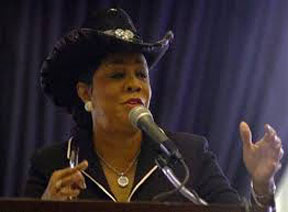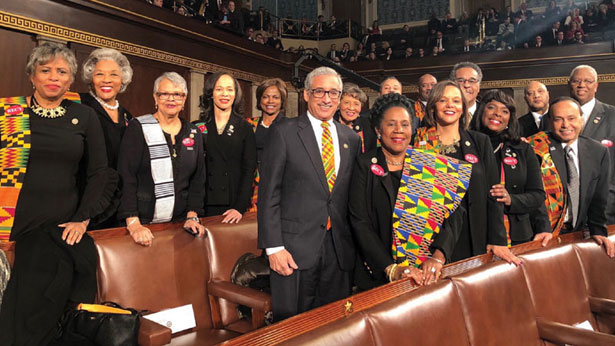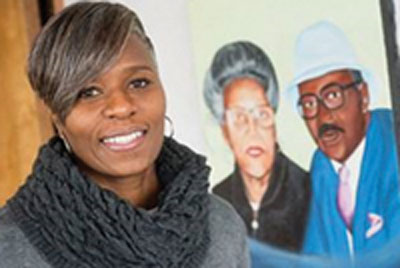
 My Brother’s Keeper: A movement whose time has come
My Brother’s Keeper: A movement whose time has come
By Congresswoman Frederica S. Wilson (FL-24)
In 2012, 17-year-old Ivins Rosier broke into Florida Highway Patrol Trooper Robert Boody’s West Palm Beach home. Ivins shot Boody’s five-year-old German Shepherd. Five days later the dog was eu-thanized.
That same year, 17-year-old Trayvon Martin walked through a community in Sanford, Florida. I-dentified as a “suspicious person,” Martin was approached by a local neighborhood watchman who, after a struggle, shot Martin once in the heart. Martin died at the scene, 70 yards from the home in which he was staying.
On July 17, 2014, Ivins Rosier was sentenced to 23 years in prison for the death of Trooper Boody’s German Shepherd. On July 12, 2013, Trayvon Martin’s assailant was found not guilty and acquitted of his role in Martin’s murder after claiming self-defense.
When comparing these cases, one might ask how the murderer of a K-9 could be brought to justice, while the murderer of an innocent young man is set free.
Numerous theories abound, all pointing to the seemingly unfair consequences of America’s complex criminal justice system. But one fact rings true—African American males experience the highest sentencing rates and the most severe penalties for their crimes, while their peers of different races are prosecuted and sentenced for the same or harsher offenses at much lower rates.
In 2009, African American men comprised 40 percent of the U.S. male prison population, while African Americans only comprise 13 percent of the American population. One out of every 15 African American men is incarcerated. By age 18, 30 percent of Black men will have been arrested for non-traffic offenses. By age 23, that number jumps to 49 percent. According to the Bureau of Justice, one in three Black men is expected to be imprisoned during his lifetime.
With only 5 percent of the world’s population, the United States holds 25 percent of all prisoners, the highest incarceration rate in the world, the majority of them young, Black American men.
In my years of studying the behavior of Black boys and in supporting the programs that empower them, I’ve never heard a national call by our government to address the crisis facing men of color. This is why I’ve been so enthusiastic about President Barack Obama’s “My Brother’s Keeper.”
Far too many minority boys grow up believing they don’t deserve the re-wards life holds for others. Belittled by low expectations and degraded by stereotypes, these young men learn to see themselves as society often does—as caricatures of men whose only chance for success lies in a life of violence and crime.
This crisis of identity is at the root of the problems that plague our youth, disrupt our schools and too often, threaten our lives. Victimized and vilified since slavery, Black boys have always had the odds stacked against them and they’ve had fewer opportunities to succeed.
They are constantly reminded of the perceptions of them. When Black boys go into stores they are followed.
People cross the street, lock their car doors or hold on to their purses for dear life when they see them. When a Black boy is spotted he is automatically a suspect. Even Black people fear Black boys. This is unconscionable.
Statistics reveal how Black boys lag behind in areas such as high school graduation, college preparation, and employment rates, all affecting our nation’s ability to compete within a global society. With negative social and economic consequences for this nation, this crisis cannot be relegated to the African American community; it is an American epidemic.
With “My Brother’s Keeper,” President Obama has helped move us forward in acknowledging and addressing our problem.
The goals of “My Brother’s Keeper” include reaching deeply into federal education and criminal justice programs to find the solutions that can make the difference in the lives of millions of young men and boys of color. These outcomes will impact every individual and every community because it includes investing in America’s human capital where so much is currently being lost.
All of us must do our part if we are to succeed in this monumental endeavor to help our children achieve their full potential. President Obama has taken “My Brother’s Keeper” a step further to ensure success by issuing the “My Brother’s Keeper Communities Challenge” to local leaders around the country. It’s a challenge to mayors, community leaders, and the private sector to coordinate their efforts and take action at the local level to improve the trajectories of and improve life-outcomes for young people in this country.
Based off the White House’s “My Brother’s Keeper” taskforce study – the President is asking communities to tackle as many of the following goals as possible: ensure all of our children enter school cognitively, physically, socially and emotionally prepared and can read at grade level by third grade; ensure that all of our young people graduate from high school and complete post-secondary education or training; ensure all youth out of school are employed and safe from violent crime.
When I began to work in this field, young girls would ask me, “Ms. Wilson, you are always doing something for the boys. When are you going to do something for the girls?” My response would be, “You may think this is for the boys but this is for you. I am building you strong husbands and good fathers for your children.” And then the girls would simply say, “thank you.” Now, they gleefully say, “Ms. Wilson my boyfriend is a member of your 5000 Role Models of Excellence Project.”
The Congressional Black Caucus applauds and thanks President Obama for elevating this effort and this conversation to the national stage with “My Brother’s Keeper” and we all support him in helping it to be a success. But we cannot do it alone. We as a nation must rally around the President and thank him for his courage to stand up, speak out, and act. As the greatest democracy in the world, this is our moral obligation.
Congresswoman Frederica S. Wilson is the founder of the 22-year-old 5000 Role Models of Excellence Project, a dropout prevention/mentoring program for boys of color operated in the Miami Dade County Public Schools. Congresswoman Wilson is also founder and co-chair of the Congressional Black Caucus My Brother’s Keeper Taskforce.
The Congressional Black Caucus (CBC), comprised of 43 Members of Congress, has been the voice for people of color and vulnerable communities in Congress for more than 40 years. The CBC is committed to ensure that everyone in the United States has an opportunity to achieve their version of the American Dream.





Be the first to comment